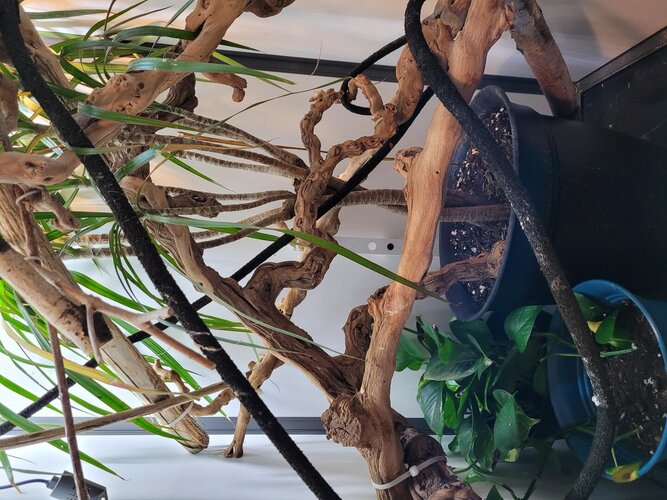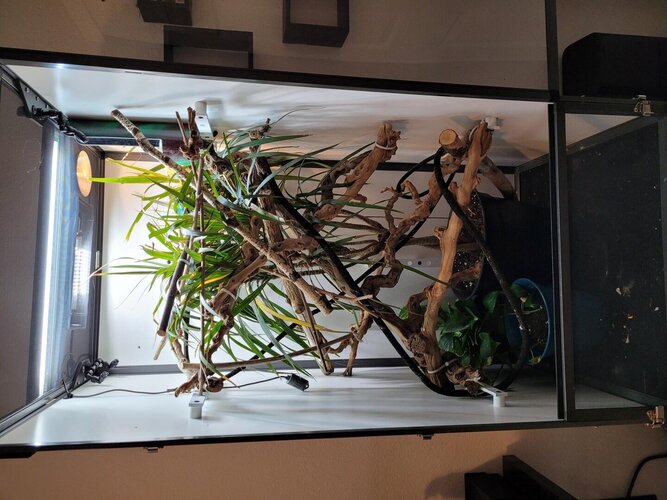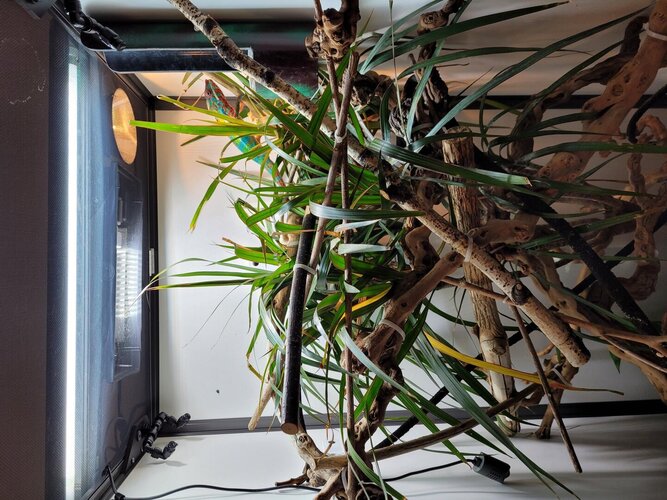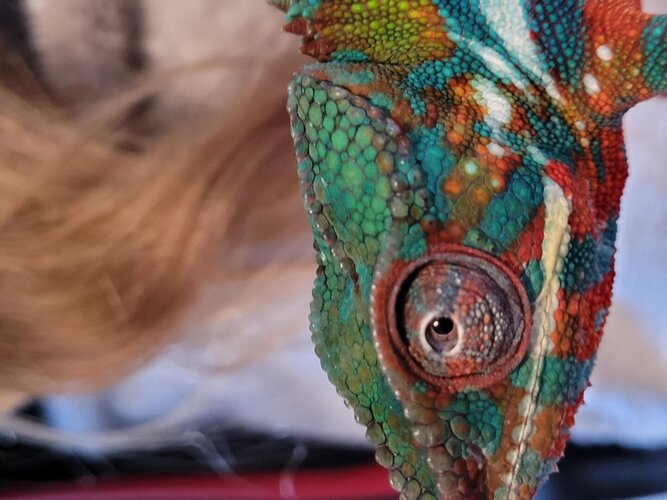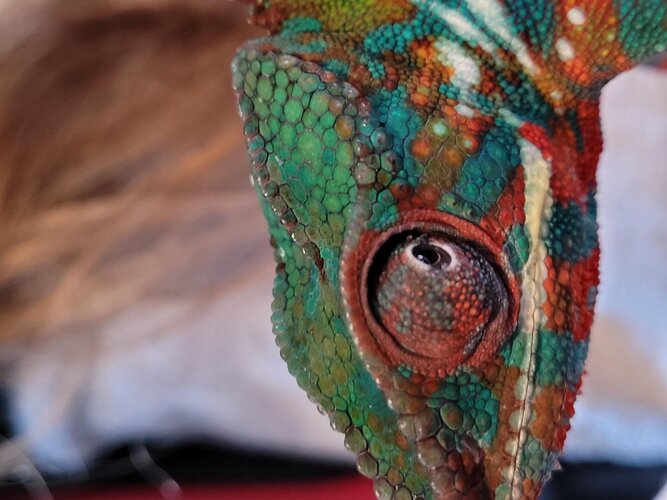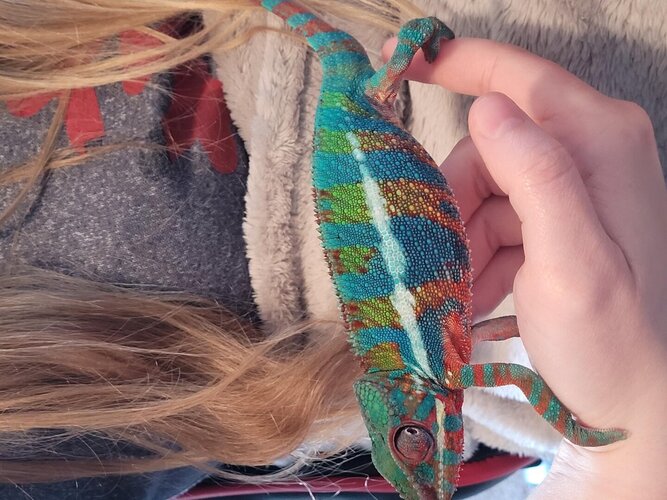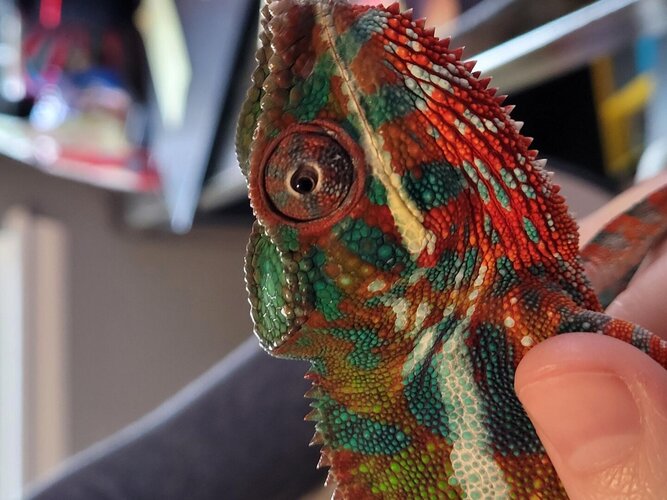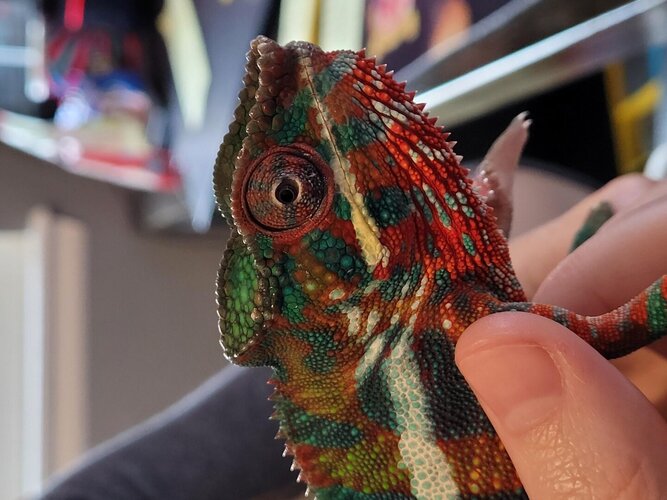Hello Everybody!
Current Problem - The current problem you are concerned about. - Our little guy has displayed some eye irritation for the last month or so that I was hoping to get some feedback/suggestions on. He has seen a vet on three occasions now but the vet let us know that he is at a bit of a loss for what is going on and that we should reach out to other owners to see if anybody has had a similar experience. For a little over a month he has been bulging/cleaning his right eye multiple times a day. I have seen him at times even rub the eye against branched in his enclosure as well. Health wise the vet thinks that he is doing well and all his other behaviors have been normal (not lethargic, apatite is good, etc.). In the last month we have had him on an antibiotic eye drop and the vet has done eye flushes as well. He seems to respond well to the eye drops/flushes but the two times that we have stopped providing drops (treatment was done not just stopping randomly) his eye seems to go back to bothering him after a couple days. This makes me wonder if there is something about his cage/husbandry that is causing irritation or issues and the last thing I want is for our little guy to be in pain or be uncomfortable. Any and all recommendations or advice would be greatly appreciated and thank you all very much!
Chameleon Info:
Cage Info:
Current Problem - The current problem you are concerned about. - Our little guy has displayed some eye irritation for the last month or so that I was hoping to get some feedback/suggestions on. He has seen a vet on three occasions now but the vet let us know that he is at a bit of a loss for what is going on and that we should reach out to other owners to see if anybody has had a similar experience. For a little over a month he has been bulging/cleaning his right eye multiple times a day. I have seen him at times even rub the eye against branched in his enclosure as well. Health wise the vet thinks that he is doing well and all his other behaviors have been normal (not lethargic, apatite is good, etc.). In the last month we have had him on an antibiotic eye drop and the vet has done eye flushes as well. He seems to respond well to the eye drops/flushes but the two times that we have stopped providing drops (treatment was done not just stopping randomly) his eye seems to go back to bothering him after a couple days. This makes me wonder if there is something about his cage/husbandry that is causing irritation or issues and the last thing I want is for our little guy to be in pain or be uncomfortable. Any and all recommendations or advice would be greatly appreciated and thank you all very much!
Chameleon Info:
- Your Chameleon - The species, sex, and age of your chameleon. How long has it been in your care? - Panther Chameleon (locale cross from Kammerflage Kreations), Male, 9 months and 2 days old, He has been in our care since 11/24/20
- Handling - How often do you handle your chameleon? - As of late it has been daily to give him the eye drops, but prior to that we only tried to handle him about 2 days a week to avoid stress
- Feeding - What are you feeding your cham? What amount? What is the schedule? How are you gut-loading your feeders? - We currently feed him black soldier fly larva and occasionally hornworms. Usually he eats about 12 - 15 larva a day and 2 hornworms every couple of days. We feed him around noon everyday of the week. We are not gut loading the larva and the hornworms just eat the food that is provided with them when they arrive (order from Josh's Frogs online).
- Supplements - What brand and type of calcium and vitamin products are you dusting your feeders with and what is the schedule? - We dust every meal with Rep-Cal Calcium (No D3) and then alternate every Sunday between Rep-Cal Calcium (with d3) and a multivitamin. We had been using Zoo Med Reptivite (without d3) for the multivitamin but just changed this last weekend to Repashy Supervite on the recommendation of the vet (he thought that the Vitamin A in the Repashy supervite was better than the vitamin A that was in the Zoo Med Reptivite as we were/are considering a possible vitamin A deficiency as the cause of the eye issues.).
- Watering - What kind of watering technique do you use? How often and how long to you mist? Do you see your chameleon drinking? - We have been relying on the water left on the plants after misting to provide water. I have been very skeptical of this since we got him as I rarely get to see him drink but all of his urates have a nice white color so it leads me to believe he has been getting enough water. The mister that we use is a Mistking automatic mister. It has a sensor in the cage that will kick the mister on when the cage reaches 50% humidity and bring it back up to 70%. This leads to shorter misting sessions but they happen every couple of hours. I have seen many people that like to do a long 5 minute mist in the morning and a long one in the afternoon and have debated switching to that style if need be. The other concern that I had is that the sensor is higher up in the cage and in the path of the mist itself so the humidity may not be as high as the sensor seems to think. Should I move it lower to get a better reading?
- Fecal Description - Briefly note colors and consistency from recent droppings. Has this chameleon ever been tested for parasites? - Fecal matter has looked good. He consistently has droppings and they do not appear to show any orange coloration. He has not been tested for parasites before.
- History - Any previous information about your cham that might be useful to others when trying to help you. - As stated above his behavior minus the eye issues has been normal which the vet thinks is a good sign. The vet has also stated that he does not see any damage on the actual eye itself so it seems to be an irritation issue mainly.
Cage Info:
- Cage Type - Describe your cage (Glass, Screen, Combo?) What are the dimensions? - It is a Dragon Stand "Tall Hybrid Cage" (link here: https://dragonstrand.com/product/tall-hybrid-chameleon-cage-system/) which is 24"x24"x48". The front, top, and bottom are mesh and the sides are PVC.
- Lighting - What brand, model, and types of lighting are you using? What is your daily lighting schedule? - We have a 22" Reptisun 5.0 UVB 24w bulb at the top of the cage. We also have a Zilla mini halogen dome light for his basking light that has a 25w bulb. His lights are on for 12 hours (8am - 8 pm) and off the rest of the time. There is also a "Jungle Dawn" LED vivarium light that is suppossed to help the plants grow that is on during the same 12 hour time period his other lights are on as well.
- Temperature - What temp range have you created (cage floor to basking spot)? Lowest overnight temp? How do you measure these temps? Using an infrared thermometer gun I got a temperature of 73 degrees at the bottom of the cage, 82 degrees at the top of his sticks, and a temperature of 106 degrees on the surface of the top his basking stick (It has been on all day at this point but I do realize that this is too hot regardless of that. I will be immediately trying to find a way to raise the basking light off the top of the cage to put more distance between that basking area and the light to cool it down).
- Humidity - What are your humidity levels? How are you creating and maintaining these levels? What do you use to measure humidity? - Humidity sits between 50% - 70% at all times (regulated by the Mistking sensor) but I do have my concerns with how accurate that reading is (see above). More misting information is above. One thing to note is that we use only distilled water in the misting system.
- Plants - Are you using live plants? If so, what kind? - We have live plants in the enclosure. At the bottom there are a couple of pothos plants and the main plant in his cage is a dragon tree (Dracaena marginata)
- Placement - Where is your cage located? Is it near any fans, air vents, or high traffic areas? At what height is the top of the cage relative to your room floor? - The cage is located on top of a small table that sits in our office. It is near a celling fan (however that fan does not get turned on at all) and not near any air vents. It is a "medium" traffic area. We tend to walk by the front of his cage a couple times an hour.
- Location - Where are you geographically located? - We are located in the front range of Colorado (near the Denver area)

